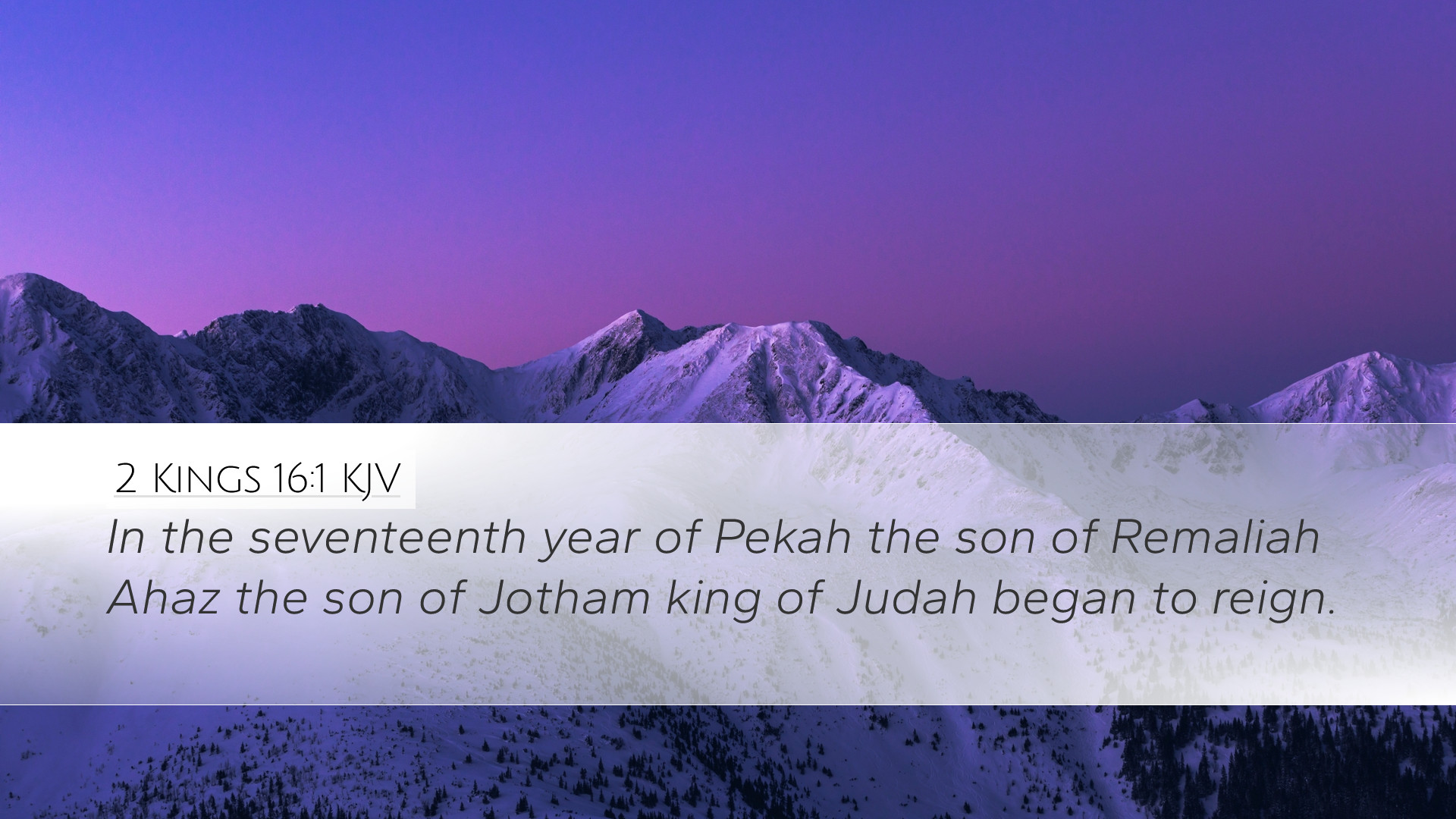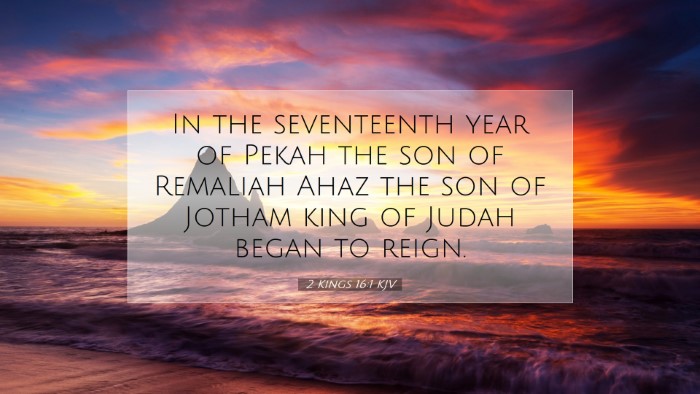Old Testament
Genesis Exodus Leviticus Numbers Deuteronomy Joshua Judges Ruth 1 Samuel 2 Samuel 1 Kings 2 Kings 1 Chronicles 2 Chronicles Ezra Nehemiah Esther Job Psalms Proverbs Ecclesiastes Song of Solomon Isaiah Jeremiah Lamentations Ezekiel Daniel Hosea Joel Amos Obadiah Jonah Micah Nahum Habakkuk Zephaniah Haggai Zechariah Malachi2 Kings 16:1
2 Kings 16:1 KJV
In the seventeenth year of Pekah the son of Remaliah Ahaz the son of Jotham king of Judah began to reign.
2 Kings 16:1 Bible Commentary
Commentary on 2 Kings 16:1
In 2 Kings 16:1, we are introduced to the reign of Ahaz, king of Judah. This verse serves as a pivotal point in the historical context of the kingdom of Judah, tracing not only the lineage of Ahaz but also setting the stage for the events that will follow in the narrative. In temporal succession, Ahaz comes to the throne after his father, Jotham, whose reign is noted for its adherence to God’s commands. Conversely, Ahaz’s reign is marked by apostasy and idolatry.
Contextual Background
The historical backdrop of this verse is essential. Ahaz reigned during a tumultuous period characterized by political alliances and military threats. The northern kingdom of Israel was led by Pekah, and Syria was ruled by Rezin. Both had formed a coalition against Judah, intensifying the political crisis that defined Ahaz’s rule.
Significance of Ahaz's Age
Ahaz ascended to the throne at the young age of twenty. The choice to include his age in the narrative is deliberate and signifies the vulnerability and immaturity inherent in youthful leadership. This is reiterated by Matthew Henry, who observes:
“A king at twenty is generally a young king; he is seldom prepared for the weighty matters of state, especially when the counsel he receives may lead him astray.”
Analysis of Ahaz's Character
Ahaz is presented as a ruler who deviated markedly from his forebears. His character reflects the shift from the righteousness of Jotham to blatant idolatry. Albert Barnes highlights this decline, stating:
“Ahaz did not follow the examples of his forefathers, particularly his father Jotham, but emulated the kings of Israel, whose paths led to destruction.”
Influence of Idolatry
As the commentary unfolds, the presiding theme of idolatry becomes evident. Ahaz initiated and embraced practices that were contrary to the Mosaic Law. Adam Clarke elaborates on this aspect by stating:
“The worship practices Ahaz adopted, from the high places to the cultic objects of paganism, reflect the tragic culmination of leadership devoid of faithfulness to God.”
Systematic Examination of the Text
The text operates on multiple levels. Firstly, Ahaz's age (twenty) could suggest a divine commentary on the increase of youth at the helm, which brings with it an inclination towards folly without the tempered wisdom that age often affords. Secondly, the mention of his mother, Abi, serves to connect the historical line and implicates her influence in the early years of his reign.
The Role of Abi, Mother of Ahaz
Abi’s mention might indicate the potential influences in Ahaz’s early life, particularly regarding the spiritual climate he inherited. Matthew Henry notes:
“While mothers play pivotal roles in shaping the lives of their children, Abi seems less a guiding force and more a passive participant in her son’s evolution into a corrupt ruler.”
The Implications of Ahaz's Rule
Ahaz's rule is consequential not only for Judah but also for the unfolding prophetic narrative in the Old Testament. His decisions precipitate God's impending judgment, drawing the nation into a deeper tumult as they distance themselves from their covenant with God.
Prophetic Context
As the political landscape shifts around him, faced with hostile neighbors and internal dissent, ahaz’s reliance on Assyria rather than trusting in God raises critical theological questions that resonate within prophetic literature. This pattern would lead eventually to consequences that are prophecies given through Isaiah and other prophets during Ahaz's reign.
Concluding Thoughts
2 Kings 16:1 sets the foundation for understanding the complexities of leadership in the biblical narrative. The rise of Ahaz from righteous lineage into unrighteousness can serve as a cautionary tale to current leaders — a reminder of the fragile nature of power when divorced from moral and spiritual integrity. The reflections made by biblical commentators like Matthew Henry, Albert Barnes, and Adam Clarke encourage contemporary readers to delve deeper into their understanding of leadership, faith, and the consequences of choosing paths contrary to divine guidance.
Lessons for Modern Readers
- The Importance of Foundation: Leaders must remember the importance of their spiritual and moral foundations.
- Consequences of Apostasy: Turning away from God's ways leads to inevitable decline and judgment.
- Influence of Surroundings: The context in which leaders operate can heavily influence their decisions.
- Calling for Faithfulness: Faithfulness to God must be upheld in leadership, regardless of external pressures.


